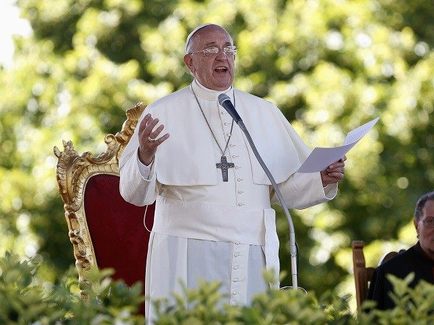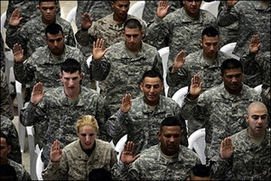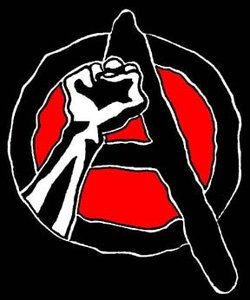 “[A] feminist perspective on the commons is important because it begins with the realization that, as the primary subjects of reproductive work, historically and in our time, women have depended on access to communal natural resources more than men and have been most penalized by their privatization and most committed to their defense.” - Silvia Federici, “Feminism and the Politics of the Commons” “If Jesus of Nazareth, the Christ of God, cannot be an option for Gays and Lesbians, then he cannot be an option.” - M. Shawn Copeland, “Enfleshing Freedom: Body, Race, and Being” If my Facebook wall is any indication, both the Christian Left and the environmental movement are practically glowing with enthusiasm for Pope Francis’s recent encyclical, Laudato Si’: On Care for Our Common Home. Quotes from it are ubiquitous, faith leaders are instructing their followers to read it, and even secular environmentalists are convinced that it is one of the most important documents in recent memory. 350.org celebrated the encyclical, saying that it “reinforces the tectonic shift that is happening, we simply cannot continue to treat the Earth as a tool for exploitation.” Even the significantly more left-wing official page of Javier Sethness-Castro’s book Imperiled Life: Revolution Against Climate Catastrophe has been posting excerpts.
Comments
10/30/2012 Comments Serving for CitizenshipBy: HH Brownsmith  According to the United States Bureau of Citizenship and Immigration, defending one’s country is one of the responsibilities of citizenship. During the Civil War, WWI, WWII, and the Vietnam War black men enlisted with hopes of returning from the battlefield to greater equality in the states. Japanese people joined up during WWII to avoid internment camps. Latino folks have been and are continuing to be recruited for the war in Afghanistan with the promise of an expedited path to citizenship. As disgusting as this bargaining is, the model is not hard to understand. You kill for us and we’ll call you an American (if the political and cultural climate allows for that and you don’t die). But what if you aren’t given the initial “privilege” to enter into battle for the country? Some gay, lesbian, and bisexual people struggled with this conundrum from the creation of the armed services until September 2011. In the lead up to the repeal of Clinton’s Don’t Ask Don’t Tell Don’t Pursue policy, the debate became unsurprisingly dichotomous. Straight moral conservatives and a couple of churches (the Roman Catholic Church and the Southern Baptist Convention, namely) issued statements against the repeal. Liberals, including some affirming churches, and mainstream gay activists spent all their energy telling the world that members of the LGB community deserve the chance to fight and die for American interests. Meanwhile, other peace churches were holding their tongues on the sidelines and radical queer liberationists were being ignored, per usual. 12/26/2011 Call: Must I Be Anarchist?
 (Or, Why Are All the Anarchists Sitting Together in the Cafeteria?) 1 Editor’s Note: This piece is part one of a series of call and response between Amaryah Armstrong and Nekeisha Alexis-Baker as they consider what possibilities Christian anarchy can provide for marginalized peoples. The conversation grows out of friendship and mutual respect for each other, and from our commitments to living lives of liberation. We aim for to be an ongoing dialogue that builds on each call and response. As a result, we strongly encourage you to begin at the beginning and follow along from there. You can read Nekeisha’s response here. I must confess, I simply don’t know what to do with Christian anarchists. I am anti-domination, anti-capitalism, critical of technology, more than a little suspicious of the nation-state, and all about my citizenship being in heaven and thus having a commitment to radical politics on earth. But still, something about “Christian anarchists” just doesn’t sit well with me. It could be the irony of Christian anarchy being anti-domination and yet being predicated on domination by White men. But this is no different from other Christian identified radical groups. Exclusion is a practice we all participate in. Perhaps it is that I have yet to see or read or participate in sustained Christian anarchist discussions of White supremacy, patriarchy, and heteronormativity that go beyond the niceties of anti-racism/sexism/homophobia 101 training. Or maybe it is because explications of why anarchy is a valuable way to dismantle these systems of evil never seems to offer anything radical feminist, black, and queer Christian critiques have not already begun to deal with.
 For this month’s post, we decided to respond to people’s requests for more specific details and examples by sharing anonymous stories we solicited from people of diverse sexualities and gender identities. One of our aims was to highlight the often invisible diversity that exists in our communities and movement. We know from the Gospel parables that Jesus conceptualized the Kingdom of God as an unexpected infiltration that brings renewal from the margins. In a sweeping act of rewilding, a weed diversifies a monocultural wheat field; an unclean culture infests and transforms a hard cracker into something more satisfying. Jesus says in the gospel of Matthew (13:31-33), “The kingdom of heaven is like a mustard seed that someone took and sowed in his field; it is the smallest of all the seeds, but when it has grown it is the greatest of shrubs and becomes a tree, so that the birds of the air come make nests in its branches.” He then tells another parable: “The kingdom of heaven is like yeast that a woman took and mixed in with three measures of flour until all of it was leavened.” That which has been excluded, including non-normative sexual experiences and people of marginalized identities, is often a crucial missing ingredient for realizing the kingdom.
 Those who don’t feel this Love pulling them like a river, those who don’t drink dawn like a cup of springwater or take in sunset like supper, those who don’t want change, let them sleep. This Love is beyond the study of theology… I’ve given up on my brain I’ve torn the cloth to shreds and thrown it away -Rumi The comments to our first post were both confirming and challenging, and we will continue tailoring this series based on people’s responses. One question that emerged last time was, how does wildness include accountability in relationship? There is a growing trend in Christian moral theology to discern systems of sexual ethics that are less act-based and more relationship-based. The growing consensus among progressive Christians is that the substance or content of a sexual relationship (ex. consent, mutuality) is more important than its form (ex. gender, marital status). (For a good example of this, see Just Love by Margaret Farley of Yale Divinity School.) Theologians are also questioning secular liberalism’s respect for individual freedom held against the Christian norm of community. (Ex. Sex, Gender, and Christian Ethics by Lisa Sowle Cahill of Boston College.) Before proposing a new framework of sexual accountability of our own, we need to tease out what individualism and community look like from a specifically ecological Christian perspective.
 The ideas of civilization and the acts of colonization that seek to domesticate and control that which is inherently wild and good in God’s creation, depend on a mass of binaries—complexities of the natural and social world systemically and robotically reduced to digestible “opposites”. The opposites—male/female, straight/queer, white/black, rational/erotic, human/animal, among others—are assigned values in ways that serve to justify domination. Hierarchy first splits, then ranks; in the aforementioned set, it is clearly the first part of the binary that has been valued and the second that has been devalued. As those who identify in some way with the Judeo-Christian tradition, we belong to a legacy that has participated in the construction of a dominant culture that legitimates these binaries and therefore devalues sexual and gender multiplicity, non-white peoples, non-human animals, women, the erotic, the body and unmediated creation in general. The oppression has been naturalized by the nation-state and claims of divine ordination. We also, thankfully, belong to a legacy of renewal, re-wilding, resurrection and total liberation. This is what we hope to reclaim and understand together. We believe this process involves examining and dismantling all aspects of ourselves and our world that have been infected by the logic of civilization, including our sexuality. |
Disclaimer
The viewpoints expressed in each reader-submitted article are the authors own, and not an “official Jesus Radicals” position. For more on our editorial policies, visit our submissions page. If you want to contact an author or you have questions, suggestions, or concerns, please contact us. CategoriesAll Accountability Advent Anarchism Animal Liberation Anthropocentrism Appropriation Biblical Exegesis Book Reviews Bread Capitalism Catholic Worker Christmas Civilization Community Complicity Confessing Cultural Hegemony Decolonization Direct Action Easter Economics Feminism Heteropatriarchy Immigration Imperialism Intersectionality Jesus Justice Lent Liberation Theology Love Mutual Liberation Nation-state Nonviolence Occupy Othering Pacifisim Peace Pedagogies Of Liberation Police Privilege Property Queer Racism Resistance Resurrection Sexuality Solidarity Speciesism Spiritual Practices Technology Temptation Veganism Violence War What We're Reading On . . . White Supremacy Zionism ContributorsNekeisha Alayna Alexis
Amaryah Armstrong Autumn Brown HH Brownsmith Jarrod Cochran Chelsea Collonge Keith Hebden Ric Hudgens Liza Minno Bloom Jocelyn Perry Eda Ruhiye Uca Joanna Shenk Nichola Torbett Mark VanSteenwyk Gregory Williams Archives
October 2017
|
Search by typing & pressing enter

 RSS Feed
RSS Feed